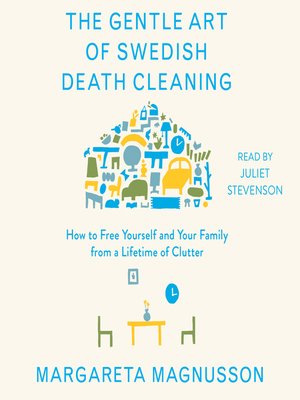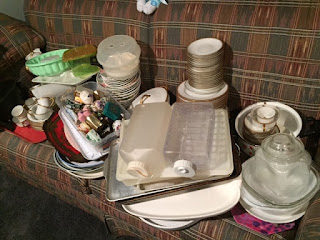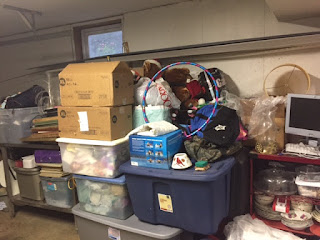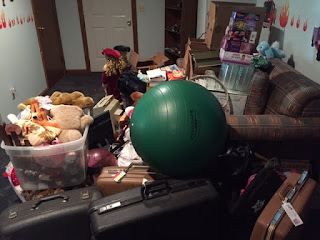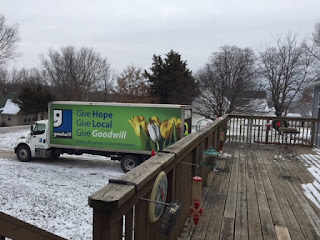Recently, I described a hound dog's eyes as "soulful", with the intent of describing his sorrowful expression. However, while reading Courtney Carver's book,
Soulful Simplicity, I embraced "soulful" to be profound love. For those that have watched
Minimalism: A Documentary About the Important Things on Netflix, you would remember Courtney, she came up with Project 333; which is a minimalist fashion challenge that invites individuals to dress with 33 items or less for three months. My fashion outcome is not to implement Project 333 (I have too many hiking-specific articles of clothing), but, I wanted to continue to learn from others that have welcomed minimalism into their household.
Courtney's journey began when she was diagnosed with Multiple Sclerosis. She wanted to improve her health, build more meaningful relationships, and relieve stress in her professional and personal lives. Courtney is a very practical minimalist, and I was able to further reflect on what is most important to me, and continue to rid myself of all the excess things I possess.
Below are some of the ways that Courtney was able to create more with less--more space, more time:
- Pain point=wake-up call
- Take a look at your pain points, your suffering. It may be a chronic condition or disease, something easy to identify, or maybe it's something else like a strained relationship, the stress of overdue bills, general fatigue, or just a sense of "something isn't right." Those things may feel normal like they did for me, but you deserve better.
- This is your wake up call
- If your life is on autopilot.
- If you never put yourself first.
- If you've become someone you don't recognize to please other people or chase some version of success that doesn't resonate with you.
- If you are constantly self-medicating with food, shopping, booze, TV, or other distractions.
- If you are worn down, beat up, stressed out, and completely depleted.
- Getting your wake-up call is not the hard part, even though it might hurt a little bit. Answering the call is. Choosing to answer the call instead of ignoring it is hard because you know if you do, things are going to change, and change.
- Having a strong list of whys will encourage you along the way, especially if things get tough.
- What is motivating your journey?
- Why the change?
- Soulful simplicity is that it's not a quick fix or something you do once. It's more like exercise where you have to keep practicing, keep starting over, and keep coming back. It's always here for you, but it's up to you to practice, connect, and reconnect with it.
- Suggested questions about making you:
- How are things going in my life?
- How do I feel physically?
- How do I feel emotionally?
- What do I love about my life?
- Whom do I envy and what do I lie about?
- What changes do I want to make?
- What changes do I have to make?
- The clutter and chaos on the outside make you feel cluttered and chaotic on the inside. Clutter attracts clutter and calm attracts calm.
- The myth of ownership
- Myth #1 Aspirational ownership
- "If I own________________, I will be, look, or feel_________."
- For example:
- If I own a home, I will be a responsible adult.
- If I own a luxury care, I will be safe, comfortable, and appear affluent.
- If I own the latest tech device, I will be hip and cool and more productive
- If I own the best face cream, I will look young.
- If I own the right containers and hangers, I will be organized.
- If I have the right suitcase, I'll be more adventurous and see the world.
- If I have a bigger table, I will entertain more often and have more friends.
- If I wear the right workout clothes, I'll go to the gym on a regular basis and get six-pack abs.
- Myth #2 Pain- Avoidance Ownership: When we buy things to make ourselves feel better.
- Boredom: "There's nothing to do today, so let's go to the mall."
- Distractions/Procrastination: Instead of decluttering, you go to a container store and buy more stuff for storing your stuff.
- Guilt: Spending time with people you love doesn't have to cost anything.
- Myth #3 Just-in-Case ownership:
- I'm keeping this just in case ______." Articulate what you think might happen. When you realize that you have been holding on to things for the wrong reasons, it will be easier to let go.
- The just in case excuse for holding on is a messy combination of fear and procrastination. We hold on because we aren't quite ready to let go but we rarely use or enjoy the just in case stuff that we keep.
- Shopping away the pain
- Numbing: "We cannot selectively numb emotions; when we numb the painful emotions, we also numb the positive emotions."
- This new mind-set has not only saved me money, it's expanded my capacity to care for others and to find gratitude in the simplest things.
- Is this love
- I didn't have a goal in mind of how much I wanted to get rid of, but my plan was to just keep going until what was left was only what I used or enjoyed. That meant letting go of the "just in case," the "I spent so much on that," the "but someone who loves me gave me that," and even the sentimental stuff, the stuff I had saved since I was old enough to save things.
- Reset to zero
- At least once a week, reset to zero. Wash every dish, laundry, anything scattered on the floor is picked up and put in it's proper place, every surface is cleared of clutter,, and the entire house is at it's resting state. Email inbox is zeroed (every message is either deleted or acted upon and archived).
- The magic of letting go
- We may each hold on to different items, but we experience a similar struggle in terms of the hold our things have on us. When letting go, it helps to start with the easy stuff like duplicates, and things you know you won't miss---strengthening your decluttering muscles
- Dave Ramsey states that 78% of Americans live paycheck to paycheck and 90% are buying things they cannot afford.
- It is ingrained in us to believe that success and growth are tied to bigger and better, so a choice to live in a smaller space and live with less brings up questions. It's interesting how we make assumptions about people based on what they own.
- Francine Jay, author of The Joy of Less suggests 'Your home is a living space, not a storage space." Moving into a smaller space you may begin to notice
- Clutter attracts clutter
- Less is not nothing
- You don't have to fill up all the space
- Less indoor space provides more time to appreciate the outdoor space
- When you need to buy things for your things, it's time for fewer things
- Clutter is more obvious (living in a sprawling space, clutter is easier to ignore; in a small space, clutter demands immediate attention)
- It's easier to live in the world when you live in a small space
- The things that make a place feel like home aren't things
- Making space: Action Steps
- Choose your myth
- Identify your pain
- Take care (trade shopping for self-care)
- Try a purchase pause
- Call a stop to shopping for all nonessential items for the next thirty days. Write down everything you want to buy or consider buying and how much each thing costs. At the end of thirty days, add up the money you didn't spend. Ask yourself:
- Is there anything on the list I still want as much as I thought i did?
- If someone handed me the total amount of my fake purchases in cash, would I use it to buy all the things on the list, or use it for something else?
- Return it. If you purchased something recently that you don't use or feel bad about buying, return it.
- Let go of something expensive.
- Get rid of everything that doesn't matter.
- Hide it.
- Have fun with your family and hide something you are considering getting rid of. Don't tell them it is hidden, but box it up and put away for 60 days.
- Let the guilt flow.
- Save $1,000, if you don't have an emergency fund yet, start one with $1,000.
- Redefine success
- Share your story
- Host a simplicity summit
- Consider a smaller space.
- I used my busyness as a sign that I was important, needed, and really good at doing it all.
- It is not just saying no and freeing up time, but slowing down the clock by moving through the day with more attention and intention.
- A meaningful morning routine
- If you'd like to create a meaningful morning routine, use habit stacking.
- Build your routine slowly, habit by habit and minute by minute. Such as wake up, take a shower, use shampoo, then conditioner, dry off, and get dressed.
- Habit stacking gives you the momentum to build multiple habits simultaneously. Each habit triggers and supports the one to follow.
- I have to remind myself that no one cares about what's on my to-do list or how busy I am, or even how much I got done yesterday. What I do is not who I am.
- When your plate is full, you have three choices:
- Worry about everything on your plate, and complain about how crazy busy you are.
- Remove something from your plate to make room for something that matters more.
- Recognize your plate is full and say no to everything else so you can enjoy and engage in what is right in front of you.
- The Busy-Boycott--A 21 day Challenge to Help you Slow Down
- Stop talking about it
- Let's stop telling each other how busy we are. Perhaps, if we can physically remove the word busy from the conversation, we can stop thinking about it so much. Ban the word "busy" from your vocabulary.
- Avoid hearing the word busy by asking better questions. Instead of "How are you?" try "What made you smile today?"
- Do Less
- Every day, eliminate one thing from your calendar or to-do list. Don't postpone it, let it go.
- Linger longer
- Slowing down supports your commitment to create and protect your newfound time and space.
- Instead of saying "I don't have time" try saying "it's not a priority" and see how that feels.
- The real problem was me. I became my work instead of choosing work that becomes me.
- A Gentle Warrior's Manifesto to End Busyness
- I will not say yes when my heart says no.
- I will measure more by what's in my heart and less by what's on my list.
- I will prioritize love and health.
- I will ask for help.
- I will work with people who want my best, not my busiest.
- I will ask better questions, so we don't have to talk about how busy we are.
- I will not let my phone run my life.
- Phones were designed for connection, but the more our phones can do, the less connected we seem to be.
- I will trade my FOMO for JOMO
- Fear of missing out to joy of missing out.
- I will create space for solitude
- Without solitude, I feel depleted. Without quiet, I become overwhelmed and grouchy.
- I will linger longer.
- Sabbath
- We are weary because we do not rest. Weekends have become more about catching up, running errands, and planning for the next week than about resting and enjoying the day.
- How to create your own sabbath
- Schedule your sabbath. Put it on your calendar and make it important.
- Tell the world: tell everyone that you will not be available.
- Take a Sabbath eve. On the night before your planned day off, skip the heavy meal and alcohol. Go to bed early so you can wake up feeling peaceful and relaxed.
- The Art of No-ing
- Be grateful and graceful while saying no
- Be grateful for the invitation, respectful of the time and courage it may have taken someone to ask, and graceful and loving when you decline.
- Be clear
- Saying "let me think about it" is often a delaying tactic. When you know it's a no, say no.
- Keep it short.
- No is a complete sentence.
- "No thank you. I appreciate you thinking of me, but i have another commitment."
- Making time: Action Steps
- Create a 5-minute morning routine
- Grow your morning routine with habit stacking
- Apply a joyful discipline
- Choose what goes on your plate
- Boycott busy
- Choose work that becomes you
- Become a gentle warrior
- Put your phone down.
- Hope, light, and freedom were all wonderful side effects of simplicity. Simplicity will transform your closet, your kitchen cabinets and all the spaces in your life.
- Trying to convince others
- It's not up to us to tell others what's important to them.
- We can have conversations and make recommendations, but we can't tell other people what they should keep or let go of, and only you can decide what matters most to you among your objects.
- Letting go of stuff has given me the space to care even more about people. By creating a soulful simplicity, I don't need sentimental items to be a sentimental person.
- The Victory Lap (save sentimental things for last)
- Strengthen your ability to let go
- Build strength by letting go of the easier stuff: clothing, kitchen duplicates, furniture.
- Tell the story of your stuff
- Take pictures of your sentimental items or write down the reason you saved them.
- Take a victory lap
- The process of giving each item one last intentional, loving use. For instance, wearing my grandmother's dress to Thanksgiving dinner. Then I mentally thank that item for the role it played in my life, remind myself that an object is not a relationship and tuck it lovingly into the donation pile.
- A Simple Life is not the end goal
- When I decided to quit stress as a way to heal, I didn't plan to simplify my life. Simplicity wasn't the plan. There was no plan. All I wanted to do was to get better. It started with a small change to my diet. Once the diet felt like the new normal, I moved on to the next sources of stress: clutter, then debt.
- Before simplifying further, think about what you really want out of this life of yours. Is this the time to simplify more, or is this the time to depend a connection with someone you love? Perhaps it is simply time to rest.
- Simplifying with the goal of become as simple as possible will prove to be as empty as changing your diet to be as skinny as possible.
- Simplicity may start in your closet. At first, the focus is on sorting and donating clothes, but after a while, your lighter wardrobe attracts more compliments, less decision fatigue, and the happy realization that you are wearing your favorite clothes every day.
Resources Discussed in Soulful Simplicity:
Whole30 Challenge
Headspace app
Book: Your Monety or Your Life
Book:The Joy of Less
Book: The Sleep Revolution
Podcast: The Slow Home
Tiny Wardrobe Tour (living and dressing with less)
Blogger list at bemorewithless/soulful-simplicity-resources
Zen Habits blog (slow-habit inspiration)
Book: You Can Buy Happiness and It's Cheap
Book: How to Live a Good Life: Soulful Stories, Surprising Science, and Practical Wisdoms
Book: The Paradox of Choice: Why More is Less
Blog: Be more with less
I
tems I decluttered this round:
- Clothing
- 4 pairs of pants (legging, sweatpant, and 2 slacks)
- T-shirt and shirt
- Chanel purse
- 1 shoe (goodbye Five Fingers)
- Accessories
- Scarf, 2 bracelets, 1 pendant, 1 charm, 2 headbands, and 1 necklace chain
- DVDs: 29 movies and 10 TV series
- Misc: coffee cup, 2 books, 2 magnets, 1 keychain, 2 hangers, 2 eclipse glasses





